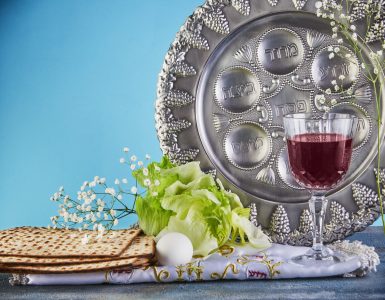Beshalach 5779
‘Hashem said to Moshe, “Behold – I shall rain down for you food from Heaven; let the people go out and pick each day’s matter on its day, so that I may test him, whether he will follow my Torah or not. And it shall be that on the sixth day when they prepare what they will bring, and it will be double what they pick every day.”… He said to them, “This is what Hashem had spoken; tomorrow is a rest day, a holy Sabbath to Hashem. That which you will bake, bake; and that which you will cook, cook; and whatever is left over, put away for yourselves for a safekeeping until the morning.’
Shemos 16:4-5 & 23
In these verses we read how the Jewish people were commanded to prepare the Mon (Manna) that they were to eat on Shabbos already on Friday. At first glance that would appear to make sense; after all it is forbidden to bake or cook on Shabbos itself. However, considering the nature of the ‘cooking’ and ‘baking’ of the Mon, a fascinating idea is contained here. The following are the comments of the Mechilta on this verse:
‘That which you will bake, bake’. Rebbi Yehoshua said, somebody who wanted the Mon to be baked, it would be baked for him and somebody who wanted it to be cooked, it would be cooked for him’.
In this Mechilta it is evident that the Jewish people had no need to act in any way in order to bake or cook their Mon. All they needed to do was ‘want’ for it to take place and it would happen of its own accord.
Based on the above, we may ask the following question: Is it in fact forbidden to perform Melachos on Shabbos using one’s mind? For if the people could ‘bake’ and ‘cook’ their foods merely by wanting as much, then why were they asked to prepare their Mon before Shabbos? It would seem that this would have not been permissible to do on Shabbos.
In the technologically and scientifically advanced world that we live in, performing acts using one’s mind is no longer science fiction. There are Brain Computer Interface (BPI) technologies currently in advanced stages of development aimed at helping people with disabilities. These technologies power a range of devices that can be operated using nerve stimulation and some of them are designed to be fully activated using the brain.
Inventions such as these introduce a number of weighty Halachic questions, particularly in the area of Hilchos Shabbos. The fundamental question is, as mentioned above – are acts that are forbidden on Shabbos when done in the ordinary way, also forbidden when done using one’s mind?
The Mechilta, as mentioned, implies that it is in fact forbidden to do Melachos using one’s mind, but according to the Sefer Chavatzeles Ha’Sharon, the Ba’alei Ha’Tosfos in Moshav Zekeinim (Bamidbar 8:11) imply that this is not the case:
‘Why was it forbidden on Shabbos to think that the Mon was to have the taste of a certain food (thereby causing it to have that taste)? The answer is that since it would only change its taste when he uttered words to that effect, it is considered that he made an improvement to it’
According to the Moshav Zekeinim, it would appear that it was only forbidden for the Jews to ‘cook’ and ‘bake’ the Mon in this way because it was in fact their words that would cause it to happen. But if it were done through the thoughts of their mind alone, it would have been permitted.
On the other hand, the Sefer Mirkeves Ha’Mishnah learns that the Mechilta does imply clearly that it would be forbidden to perform Melachos on Shabbos using one’s mind.
He also attempts to explain the notion by referencing the Gemara in Maseches Temurah that speaks of the general rule that a negative command that does can be transgressed without performing an act is not punishable with lashes. Generally, even speaking is considered to be in the category of ‘Not performing an act’ and negative commandments of speech are not punishable with lashes.
Nonetheless, transgressing the prohibition of Temurah – switching a consecrated animal for another animal – is punishable by lashes. Despite the fact that the sin took place merely though his words, we give significance to the fact that the effects of those words produce an act of sorts – the actual Halachic switching (Temurah) of the animal. Therefore, Temurah is considered to be a sin that includes a tangible activity.
The same reasoning, argues the Mirkeves Ha’Mishnah, can be applied here to the case of the Mon. Since the thoughts in the person’s mind serve to produce an actual physical result – the baking or cooking of the Mon – those thoughts could themselves be considered an act and a Melacha that is forbidden on Shabbos.[1]
Many of the essays that have been written on this topic in recent years cite the words of the Ketzos Ha’Shulchan (Reb Chayim Naeh zt”l) in his comments to a certain section of Hilchos Muktza. The Shulchan Aruch (Orach Chayim 308:22) rules that anything that is inherently Muktza (such as a stone) can be used on Shabbos for a permissible act if it was designated for this purpose before Shabbos.
The Ketzos Ha’Shulchan (109, footnote 12) wonders why it is that the object must be set aside on Erev Shabbos. Since the manner in which one sets something aside is purely by a decision in one’s mind, there seems to be no reason why one wouldn’t be able to do this on Shabbos itself.
The answer, he writes, is that ‘it is perhaps forbidden to render an item a vessel on Shabbos’. In other words, despite the fact that the act of designating something before Shabbos is done with one’s thoughts, it is nevertheless considered to be an actual forbidden act.
Rav Yisrael Rosen zt”l (Techumim 15, p378) writes in this regard: ‘When I discussed this topic with Reb Shlomo Zalman Aurbach zt”l he mentioned that the same can be seen from the law that one may not set aside Terumos and Ma’asros on Shabbos because it looks as though one is completing something. Although Terumah can be assigned using ones thoughts, the fact that doing so is nonetheless forbidden, implies that thoughts are considered like actions as far as the laws of Shabbos are concerned’.
There does however seem to be something of a contradiction in the rulings of Reb Shlomo Zalman Aurbach in this regard. In the Sefer Shemiras Shabbos Kehilchasa (Chapter 20, comment 172) the author quotes Reb Shlomo Zalman who challenges the idea of the Ketzos Ha’Shulchan: ‘How do we know that it is forbidden to create a vessel with thoughts alone? Surely, we find that it is permitted to knead dough even for the purposes of helping separate Challa from another dough that was kneaded the previous day since the accomplishment is only done with one thoughts (Ramo Orach Chayim 506:3). We do not find that the Chachamim forbade things brought about merely by thoughts except in the cases of separating Teruma, Ma’asros and consecration. Certainly, rendering something as a vessel that can contract impurity through one’s thoughts is permitted on Shabbos.’ He also notes that the same is implied from the words of Rebbi Akiva Eiger (in his comments to the Maggein Avraham S:K 56).[2]
In truth though, there is a fundamental difference between the subject of the Mon and that of Muktza, as follows.
Sometimes an act simply establishes a certain status for an item such as setting aside an item for Shabbos as mentioned above, or vowing that an item will go to Tzedaka or become Terumah. These acts change the status of the item in an abstract sense. Other cases however involve actions that have actual, physical implications, such as cooking or baking.
As far as the first group of actions are concerned, there in room for a discussion at to the status of these acts when they are performed by thoughts alone. Would we distinguish between cases in which the outcome is brought about by physical acts and cases in which they are achieved with thoughts alone? Does the Torah relate to a person’s thoughts as significant without regardless of their ability to effect a certain outcome?
But the second category of actions – those concrete and physical ones, relate entirely to the world which one fashions with the work of one’s hands. Cooking and baking for example are acts that a person does exclusively with his body.
In that light it can well be argued that when acts such as these are somehow wrought by one’s thoughts, that would be considered inherently unusual and would perhaps not achieve the status of ‘act’ to the same degree. If so then they might well be permitted to perform on Shabbos.
Let us now return to the words of the aforementioned Mechilta. We argued previously that the words of the Mechilta imply that actions brought about with Machshava (thoughts) are indeed forbidden to perform on Shabbos. This, we note, is even in the context of physical actions (the second category we just mentioned above).
Kli Chemdah though, amongst his first thoughts on this topic, argues that even if we were to say that it is forbidden to perform Melachos with one’s thoughts, this would only be true of Shabbos, not Yom Tov. The reason that this would be so, he writes, is that Shabbos is built upon the concept that Hashem rested from Melacha and it is this that we emulate by desisting from it too. It therefore follows that any Melachos, even those fashioned by one’s thoughts, are forbidden.
The Yomim Tovim by contrast were sanctified by the human hands of the Beis Din and are unrelated to Hashem’s manner of performing Melacha. Their prohibition of Melacha must surely be defined by that which is considered ordinary Melacha in human eyes – in other words ordinary physical creation, not results yielded from thoughts.
Next the Kli Chemdah turns his attention to a difficult question of the Revid Ha’Zahav. Revid Ha’Zahav notes that when ascribing the source for the Melacha of cooking and baking on Shabbos, the Talmud Bavli and Talmud Yerushalmi take two very different paths. According to the Bavli the source of the Melacha is the fact that in the Mishkan they would cook[3] the herbs in order to create the dyes for its various components. And just like all acts that were performed in the creation of the Mishkan became Melachos of Shabbos, so did this one.
The Yerushalmi (in Maseches Beitzah) however learns that the Melacha of cooking can be derived from Moshe’s command to the Jewish people to cook or bake their Mon before Shabbos. This surely implies that on Shabbos itself it would be forbidden.
Kli Chemdah however argues that there is no argument or discrepancy between the Bavli and Yerushalmi at all. For the Yerushalmi certainly agreed that the actual source for the Melacha of cooking and baking is the cooking of the dyes in the Mishkan. It merely meant, in passing, to illustrate that cooking on Shabbos is certainly forbidden.
In fact, wrote the Kli Chemdah, there are a number of reasons why the cooking of the Mon couldn’t possibly serve as a source for the Melacha of cooking:
Firstly the Mon could be eaten raw. According to many opinions, whilst cooking something that could be eaten raw is forbidden on Shabbos, it isn’t fully a Melacha.
Secondly, the Mon did not in fact undergo any process of cooking or baking. Rather it instantly was transformed into a cooked or baked item, according to the desires of the owner. Even if the Torah did forbid this specific act at that time, one cannot possibly learn a general rule from this about the Melacha of cooking or baking in ordinary cases.
Thirdly, even if one were to say that the Mon did somehow undergo an actual process of physical cooking or baking, one cannot derive the actual Melacha of cooking from it. For the cooking and baking of the Mon was performed through thoughts for which it is impossible to make somebody liable. It must therefore have merely been forbidden but not have been considered an actual Melacha.
This third argument of the Kli Chemdah clearly shows that as much as he argued earlier that acts wrought by thoughts alone were in fact forbidden on Shabbos (as opposed to Yom Tov) that is only because performing them would contradict the overriding atmosphere that must pervade the Shabbos. He would not however claim that they would be considered Melachos in the proper sense.
One further possibility relates to an idea mentioned above. The same Kli Chemdah goes on to say that since the cooking of the Mon wasn’t achieved in the ordinary fashion but instead through the vehicle of Machshava, this would in fact be comparable to doing a Melacha ‘Ki’leachar Yad’ which is not considered a Melacha at all seeing as it is done in an unusual fashion (see Orach Chayim 340:1, Biur Halachah s.v. V’Chayav and Mishnah Berurah S.K. 2).
However, he then discounts this as a possibility because as far as the Mon was concerned, this was its method of cooking. One cannot therefore consider its cooking as strange or Ki’leachar Yad-like. One must always relate to the circumstances of that type of cooking and not apply one’s ordinary circumstances to it.
That being the case, one may now fairly reason, that any act of cooking, be it unusual in global terms, if it is the ordinary method for the item and circumstances in which it is being done, should not be considered Ki’leachar Yad.
But we can equally see that if an item is usually cooked in a physical manner (as is the case for every act of cooking not involving the Mon) then if it is cooked using Machshava, that would not be considered a Melacha.
All agree, in conclusion, that even if in the distant future many acts will be done through the vehicle of Machshava this will not change their basic nature. Cooking for example will continue to be mainly performed by man using his ten fingers and physical body. If so, then even in those future times, if one performs an act using Machshava it will not be considered a Melacha that is Biblically mandated.
Since the purpose of this essay is not to give Halachic rulings but to bring up topics of Refuah that are relevant to the weekly Parsha, it deals in the main with sources that are relevant to the Parsha. There are however many other important sources to consider. Moreover, with regards the Halachos of Shabbos there are many other relevant concepts particularly in the realm of the D’rabanans. We wish to remind everyone not to derive practical Halacha from these essays unless we directly quote the Nasi of our Beis Ha’Medrash – Ha’Gaon Ha’Gadol Rav Asher Weiss shlit”a in which case we are most careful to accurately quote him so that we understand his opinion on the topic at hand.
[1] In truth the comparison made by the Mirkeves Ha’Mishna between the cooking of the Mon and the subject of Temurah touches upon a very involved and complicated topic which is beyond the scope of this article. See Gemara Temurah 3a-b, Bava Metzia 90b, Rambam Hilchos Temurah 1:1 with Maggid Mishna. The reason for bringing this example is because it raises the possibility that the prohibition in question may be related primarily to the outcome of a said action as opposed to the action itself. This, is a rather large assumption, particularly with regards to Hilchos Shabbos. Later in this essay this notion will come up again when we discuss whether an act that is done through thoughts alone can be considered ‘Ki’leachar Yad’ – an unusual ‘back of the hand’ act that is permitted on Shabbos in some circumstances.
[2] As for the question of the Ketzos Ha’Shukchan, other answers are suggested ad. loc.
[3] There is no formal source for baking on Shabbos aside from cooking.















Add comment